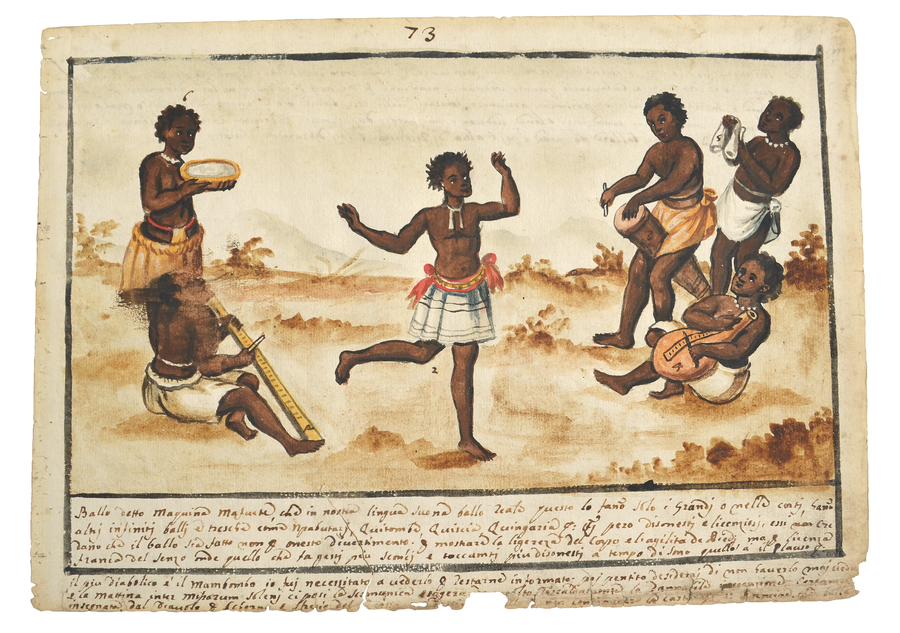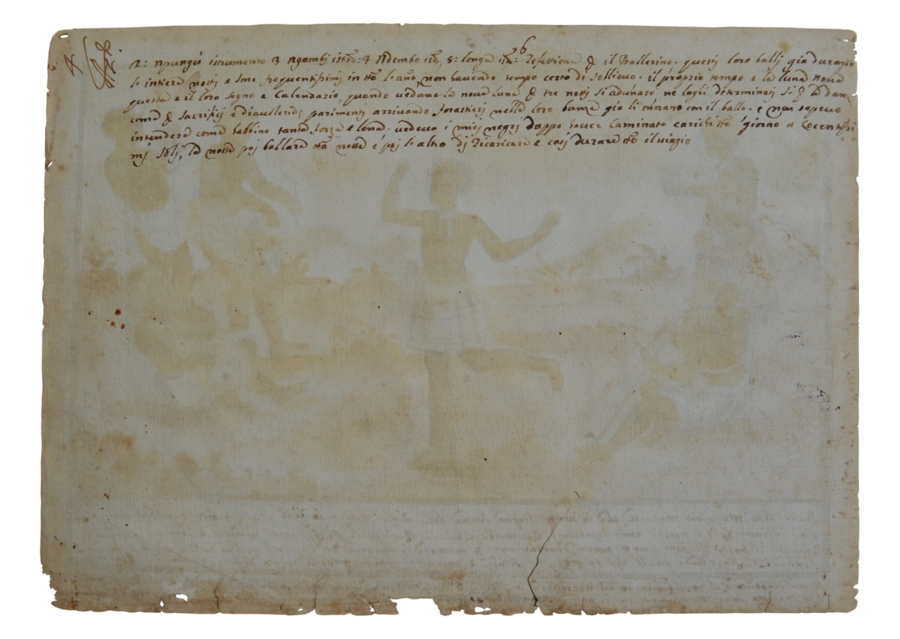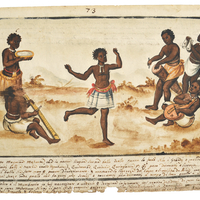PW073: Dance called maquina mafuete
Ballo detto Maquina Mafuete,1 che in nostra lingua suona ballo reale questo lo fan[n]o solo i grandi o nelle corti, han[n]o altri infiniti balli e tresche2 come Npabutari, Quitombe, Quiscia, Quingaria &:3 t[u]tti pero disonesti e licensiozi, essi non credano che il ballo sia fatto non p[er] onesto divertimento; per mostrare la ligereza del corpo e l’agilità de Piedi; ma p[er] licenza franca del senzo onde quello che fa gesti piu sconci e toccamti piu disonesti a tempo di sono quello a il Plauso &: il piu diabolico e il mambambo io fui necessitato a vederlo p[er] restarme informato; poi pentito desiderai di non haverlo mai veduto e la mattina inter missarum soleni ci posi la scomunica [. . .]insegnata dal diavolo p[er] scherzo e stupio del [. . .]
[verso] 2: npungù istromento 3: ngambi istro 4: ndembo istro 5: longa istro 6 refettione per il Ballerino questi loro balli gia duranno l’intieri notti e sono frequentissimi in t[u]tto l’an[n]o, non havendo tempo certo di sollievo; il propio tempo e la luna nova questa e il loro segno e calendario; quando vedono la nova luna p[er] tre notti si adunaro; ne loghi determinati si p[er] la danza come p[er] sacrifici e diavolerie; parimenti arrivando forastieri nelle loro banze4 gia li onorano con il ballo; e non sapevo intendere come habbino tanta forza e lena; vedevo i miei negri doppo haver caminato carichi t[u]tto giorno a cocentissimi soli, la notte poi ballare t[u]tta notte e poi l’altro di ricaricare e cosi durare t[u]tto il viaggio.
Dance called Maquina Mafuete which in our language means royal dance this only the great do or at courts; they have an infinite number of other dances and tresche such as Npabutari, Quitombe, Quiscia, Quingaria etc. but all dishonest and licentious, they do not believe that dance was not made for honest entertainment; to show the litheless of the body and the agility of the feet; but for frank license of the sense so that the one who makes the most obscene gestures and the most indecent touchings5 a tempo of the music this one has the aplause etc. the most diabolical is the Mambombo I had to see it to be informed; but then repentent, wished I have not ever seen it and in the morning inter missarum soleni6 I excommunnicated [. . .] taught by the devil as a mockery and [. . .]
[verso] 2: npungú instrument 3: ngombi instrument 4: ndembo instrument 5: longa7 intrument 6: refreshment8 for the dancer; these balls of theirs last for the entire night and are very frequent during the entire year, as there is no given time off; the designated time is the new moon this is their sign and calendar, when they see the new moon they gather for three nights in given places for dancing as well as for sacrifices and devilish things; similarly when foreigners arrive in their towns they honor them with the ball; and I did not understaand how they could have so much strength and stamina; I saw my blacks after having walked loads all day under a hard burning sun, then at night dance all night and then the next [day] load up again and thus lasting the entire journey
- 1From Kikongo ekinu (pl. makinu): dance, maquinu in Vocabularium.
- 2Tresca or trescone is Tuscan dance, famously featured in Dante’s Inferno: Sanza riposo mai era la tresca de le misere mani, or quindi or quinci escotendo da sé l’arsura fresca (Inf., xiv. 40-42).
- 3For a similar list of dances see Cavazzi and Alamandini, Istorica descrizione, 168.
- 4From Kikongo and Kimbundu, mbanza: town or city.
- 5Here touching has a clear sexual connotation.
- 6During solemn Mass.
- 7About the longa bell see discussion in Fromont, The Art of Conversion, 41-44.
- 8The image actually shows a bowl of palm wine.




Add new comment